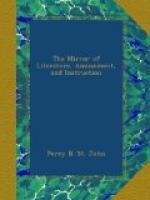In 1786, Goethe travelled in Italy, from whence he went to Sicily, and then returned to Rome, where he gave himself ardently up to the study of antiquities. At the end of three years he returned to his own country, and settled at Weimar, which was then called the Athens of Germany. Here were at that time a number of celebrated men, at the head of whom were Goethe, Wieland, and Schiller. In this congenial society, Goethe resided till his death. A view of his house, with an account of an interview with the poet, about five years since, by Dr. Granville, will be found in The Mirror, vol. xviii. After the deaths of Wieland and Schiller, the reputation of Goethe greatly increased. To form some idea of the sort of worship that was paid to him in his own country, in his lifetime, it is only necessary to read the chapter of Madame de Stael’s Germany, dedicated to that subject. The admirers of Goethe formed a sort of sect, a body amongst themselves, over whom, says Madame de Stael, the influence of Goethe was really incomprehensible. Among the honours paid to him by the illustrious men of Europe, must not be forgotten the tribute of Napoleon. When the Congress of Erfurt was held, Napoleon wished to see Goethe, with whom he conversed for some time, and at the close of the conversation he gave the poet the decoration of the Legion of Honour. In 1825, a splendid bronze medal was struck by order of the Grand Duke, and presented to Goethe, to commemorate the fiftieth year of the poet’s residence at his court.
As Goethe wrote every sort of poem, from the simple ballad to the epic, and from a proverb to a tragedy, a mere list of his works would occupy some columns. His first appearance in print was in the annuals and literary journals. But his Gotz of the Iron Hand, published with his name in 1773, and his Werther, in the year after, called at once the attention of his country to the young master-mind. The influence of these two works on the literature of Germany was electric. Hosts of imitators sprung up among the fruitful fry of small authors, and flourished until Goethe himself, by his wit, his irony, and his eloquence, put an end to the sickly sentimentalism, which he had first called into action. Gotz and Werther alone survive the creations of which they formed the nucleii. Such a production as the first, indeed, at the age of twenty-three, at once placed Goethe at the head of his country’s literature, a place which he preserved undisputed to the hour of his death.
We have referred to the multitudinous nature of the works of Goethe. Their variety was proportionate to their number. It has been well observed that “his mind never seems to have grown old, but to have presented a new phasis at each stage of his existence.” Not satisfied by taking his rank amongst the first poets of his time, his ardent genius led him to study all the different branches of literature, physical science, natural history, and the fine arts. He alike delighted in the




